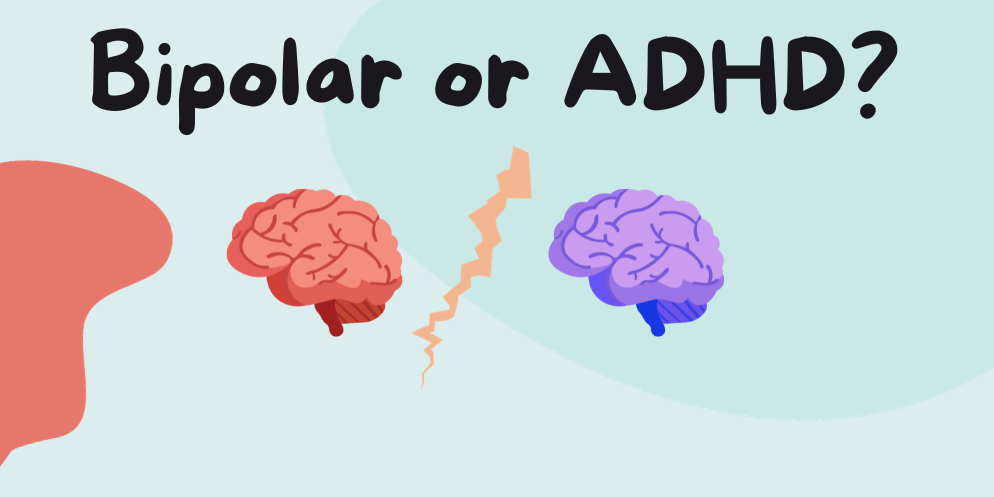Deciphering the Overlap: Navigating the Complex World of ADHD and Bipolar Disorder Diagnoses
November 23, 2023 - Reading time: 6 minutes

Reviewed by Dr. Marc Mandell, Clinical Psychiatrist with Over 30 Years' Experience
Bipolar disorder is fundamentally a mood disorder characterised by extreme emotional swings, ranging from episodes of mania or hypomania to those of depression. Phelps et al. (2018) in the Journal of Affective Disorders note this episodic nature, which starkly contrasts with ADHD's more consistent behavioural presentation.
Systematic studies, particularly of children and adolescents, reveal disproportionately high rates of ADHD among bipolar children, with figures ranging from 57% to 98%. Conversely, a prevalence of bipolar disorder is seen in 22% of those with ADHD.
The Overlap and Distinction Between ADHD and Bipolar Disorder
The clinical pictures of ADHD and bipolar disorder can easily intertwine, with both disorders presenting traits such as impulsivity and inattention. Skirrow and Asherson (2013) have addressed this overlap in BMC Medicine, providing groundwork for the discussion of these shared characteristics. Yet, these superficial similarities veil stark underlying distinctions. In their study on symptomatology, Spencer et al. (2007) in Biology of Mood & Anxiety Disorders noted that ADHD’s consistent patterns of hyperactivity, impulsiveness, and inattention often begin in early childhood and continue through adulthood, casting a persistent shadow across the lifespan of affected individuals.
Conversely, bipolar disorder embodies a different temporal pattern, as underscored by the research of Merikangas et al. (2007) in the Archives of General Psychiatry. They illuminate the episodic nature of bipolar disorder through their exploration of its manic and depressive episodes, themselves demarcated by periods of relative mood stability.
The potential for these disorders to be mistaken for one another is well documented by Nierenberg et al. (2005) in the American Journal of Psychiatry. They delve into the intricate dance of differential diagnosis, cautioning against the common pitfall of misidentifying ADHD as bipolar disorder due to overlapping bursts of energy and restlessness. The ramifications of misdiagnosis are particularly concerning when considering treatment implications, an issue that can lead to inappropriate medication prescriptions with unintended side effects or therapeutic approaches that send patients down less-effective paths towards symptom relief.
Co-occurrence of ADHD and Bipolar Disorder
The conundrum deepens when one considers that ADHD and bipolar disorder can, and often do, coexist within the same individual. Wingo and Ghaemi's (2007) contribution to the Journal of Affective Disorders sheds light on the nuances of managing such a dual diagnosis. Further studies, such as those by McIntyre et al. (2010) in Bipolar Disorders, present compelling evidence indicating that a significant portion of patients with bipolar disorder exhibit ADHD symptoms, with a subset meeting full criteria for both disorders.
These findings echo the critical sentiment expressed by Singh et al. (2006) in the British Journal of Psychiatry: accurate and comprehensive medical and psychological evaluations are indispensable in teasing apart the complex web woven by these intersecting conditions. Moving towards a proper diagnostic conclusion, they emphasise the significance of considering the chronological development of symptoms, psychiatric family history, and the patient’s full mental health spectrum.

Kowatch and colleagues (2005), offering insights in Pediatrics, further stress the need for intricate treatment design—therapeutic nuances that account for the comorbidity of ADHD and bipolar disorder. This might include a judicious use of stimulant medication, mood stabilizers, or antipsychotics, and ensuring all are balanced to sidestep the exacerbation of an underlying disorder. Combining pharmacotherapy with psychoeducational and psychosocial interventions has also yielded promising outcomes, as shown by Pavuluri et al. (2004) in Journal of the American Academy of Child and Adolescent Psychiatry.
Thus, the research landscape points to the importance of vigilance and precision in both diagnosing and treating the co-occurrence of ADHD and bipolar disorder. Only with such an attentive, evidence-informed approach can clinicians construct a management plan that both mitigates the complexities of these intertwined conditions and optimises the well-being of the individuals they affect.
Living with ADHD and/or Bipolar Disorder
Miklowitz and Scott (2009) in the British Journal of Psychiatry encourage living with ADHD and/or bipolar disorder as more than managing symptoms. It involves achieving a quality of life that honours the individual's full potential, involving a supportive network and self-care to foster resilience and stability.
While the complex interplay of ADHD and bipolar disorder diagnoses can be daunting, understanding these intricacies is crucial. In my professional capacity, I guide those embarking on this journey toward accurate diagnosis and effective management. I urge those affected to reach out, embrace support, and recognise the strength in proper treatment and understanding. Let us move forward with resolve, compassion, and a commitment to embracing the full spectrum of mental health challenges and triumphs.

